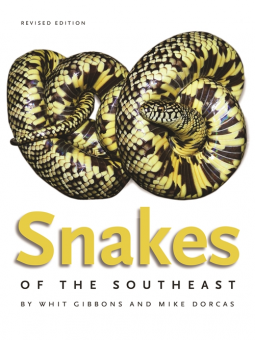
Snakes of the Southeast
by Whit Gibbons; Mike Dorcas
This title was previously available on NetGalley and is now archived.
Send NetGalley books directly to your Kindle or Kindle app
1
To read on a Kindle or Kindle app, please add kindle@netgalley.com as an approved email address to receive files in your Amazon account. Click here for step-by-step instructions.
2
Also find your Kindle email address within your Amazon account, and enter it here.
Pub Date Oct 01 2015 | Archive Date Mar 15 2016
Description
Fifty-three kinds of snakes can be found in the Southeast, almost half of all species native to North America. Filled with more than 300 color photographs and written by two renowned herpetologists, this new edition is the most comprehensive authoritative guide to the snakes of the region.
At the heart of the book are its heavily illustrated, fact-filled descriptions of each snake species. Also included is a wealth of general information about the importance of snake conservation and the biology, diversity, habitats, and ecology of snakes. Find useful information about the interactions of humans and snakes: species that are likely to be found near houses, snakes as pets, what to do in case of a snakebite, and more.
The revised edition of Snakes of the Southeast includes new photos, the latest research findings, new species discoveries, and the most current geographic range maps. Clearly written, cleanly designed, and fun to use, this guide promotes a better understanding of the conservation of this fascinating but often maligned group of animals.
Features:
Conservation-oriented approach
Over 300 color photographs, including many new images for this edition
New distribution maps for 53 species of snakes
New accounts of invasive snakes of the Southeast
Clear descriptions of each species, including differences in the appearance of young and mature snakes
Size charts, key identifiers (scales, body shape, patterns, and color), descriptions of habitat, behavior and activity, food and feeding, reproduction, predators and defense, and conservation
A Note From the Publisher
Mike Dorcas, a professor of biology at Davidson College, is author of A Guide to the Snakes of North Carolina and coauthor of Invasive Pythons in the United States (with John D. Willson).
Advance Praise
—Center for North American Herpetology
Available Editions
| EDITION | Other Format |
| ISBN | 9780820349015 |
| PRICE | $28.95 (USD) |
Links
Average rating from 6 members
Featured Reviews
The photographs are the star attraction in this book. Most species are illustrated with white background shots, several beautiful natural settings and held by a human (which is valuable for scale). In many cases juvenile and adult specimens are included. The authors accompany these delightful pictures with two to four pages of clear and comprehensive information about each snake (including identification checklist and both continental US and Southeast range maps). The authors stick in some interesting and amusing observations in sidebars.
If you have the 2005 edition, my guess is you won't find it worthwhile to upgrade. This book does add the newly discovered (2012) Kirtland's Snake, but it has been found only in one small area of northern Kentucky (it is much more common in Ohio and Indiana). Oddly enough, both books claim 53 snakes (you can get anywhere from 51 to 56 depending on how you count, but whatever method you use, the new edition has one more snake). The Eastern Garter Snake has been replaced by the closely-related Common Gartersnake, although I think two of the pictures are actually Easterns, and some of the description applies better to Easterns as well. The list for further reading has been only slightly updated, despite some excellent candidate books in the last ten years.
I could wish for a few improvements. The index covers only snake names (both common and scientific) so you cannot look up a topic, or even look up a snake by a common name other than the one chosen by the authors. There is no identification hierarchy or checklist that would allow you to identify a snake seen in the wild or in a picture. You have to guess the snake, look it up, and see if it matches the identification attributes listed. All measurements are in English units, I prefer metric in scientific books.
But these are minor gripes in a book that manages to be beautiful, clear, interesting, precise and accurate.
 Jan H, Reviewer
Jan H, Reviewer
If you live in the Southeast get this book. Spend time outside? Get this book. Charts, tips, information to identify snakes and decide friend or avoid. Learn snakes that eat earthworms and great photos of snakes that inhabit the region. I often hear people ask what kind of snake is this but having this reference on the shelf would be an asset for many. Add to the bookshelf.
 Kim C, Educator
Kim C, Educator
A nice guide with color photos to help you identify snakes found in your backyard!
The full color photos make this guide stand out. I love field guides and my favorites are those that make it easiest to identify the animal in question. To that end, color photos are, in my opinion, the most useful way to go. This guide has plenty of full color photos and detailed accompanying text to help you with any identification. There are 53 kinds of snakes found in the southeastern bioregion. This guide shows them all. You will find range maps, descriptions of snake biology, and plenty of information about the natural history of these species.
The authors are experts in their field and have done a fine job with this guide. I recommend it for any naturalist, herpetologist, or snake fan who lives in the southeast.
Readers who liked this book also liked:
JUNO
Arts & Photography, Comics, Graphic Novels, Manga, Travel










